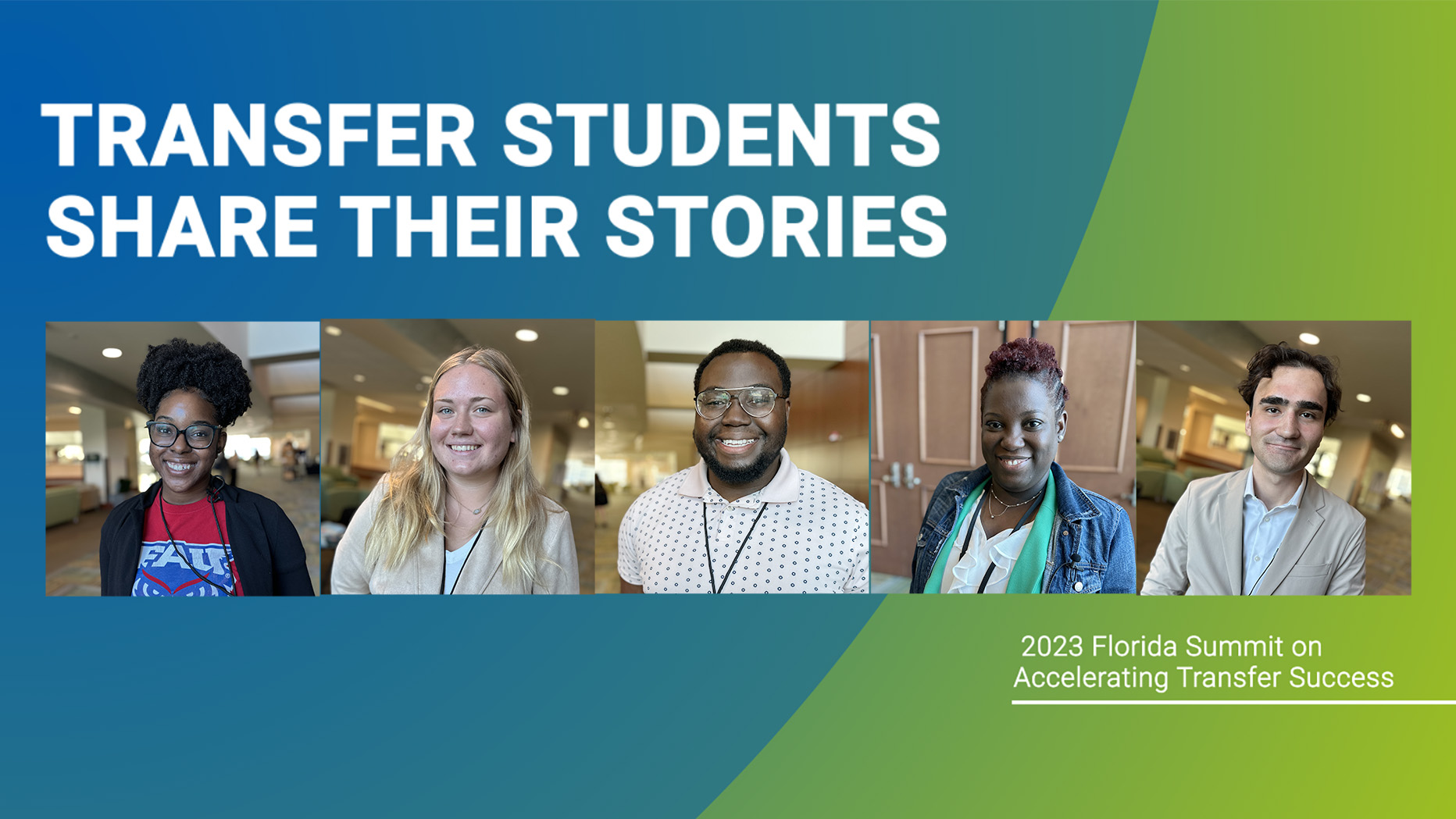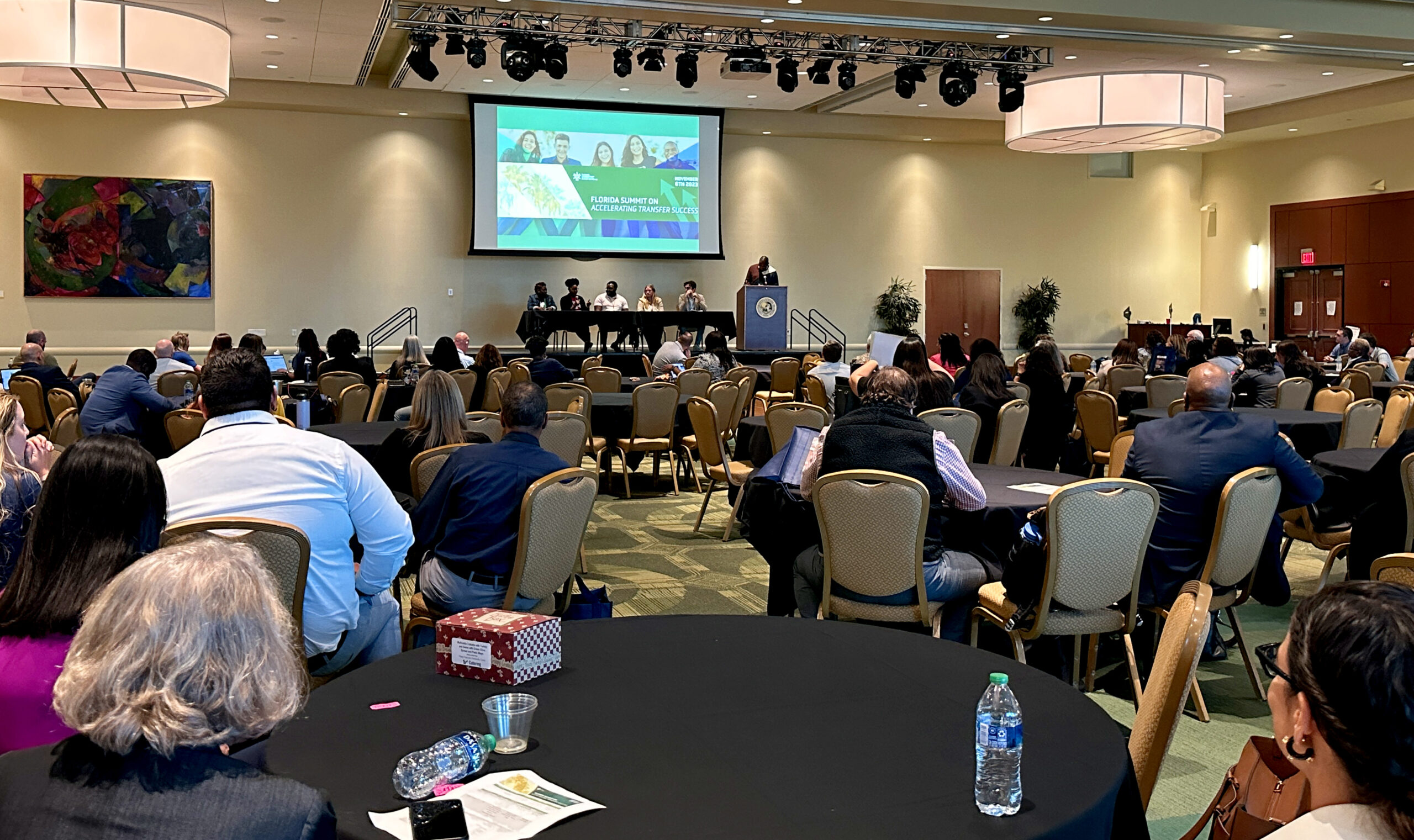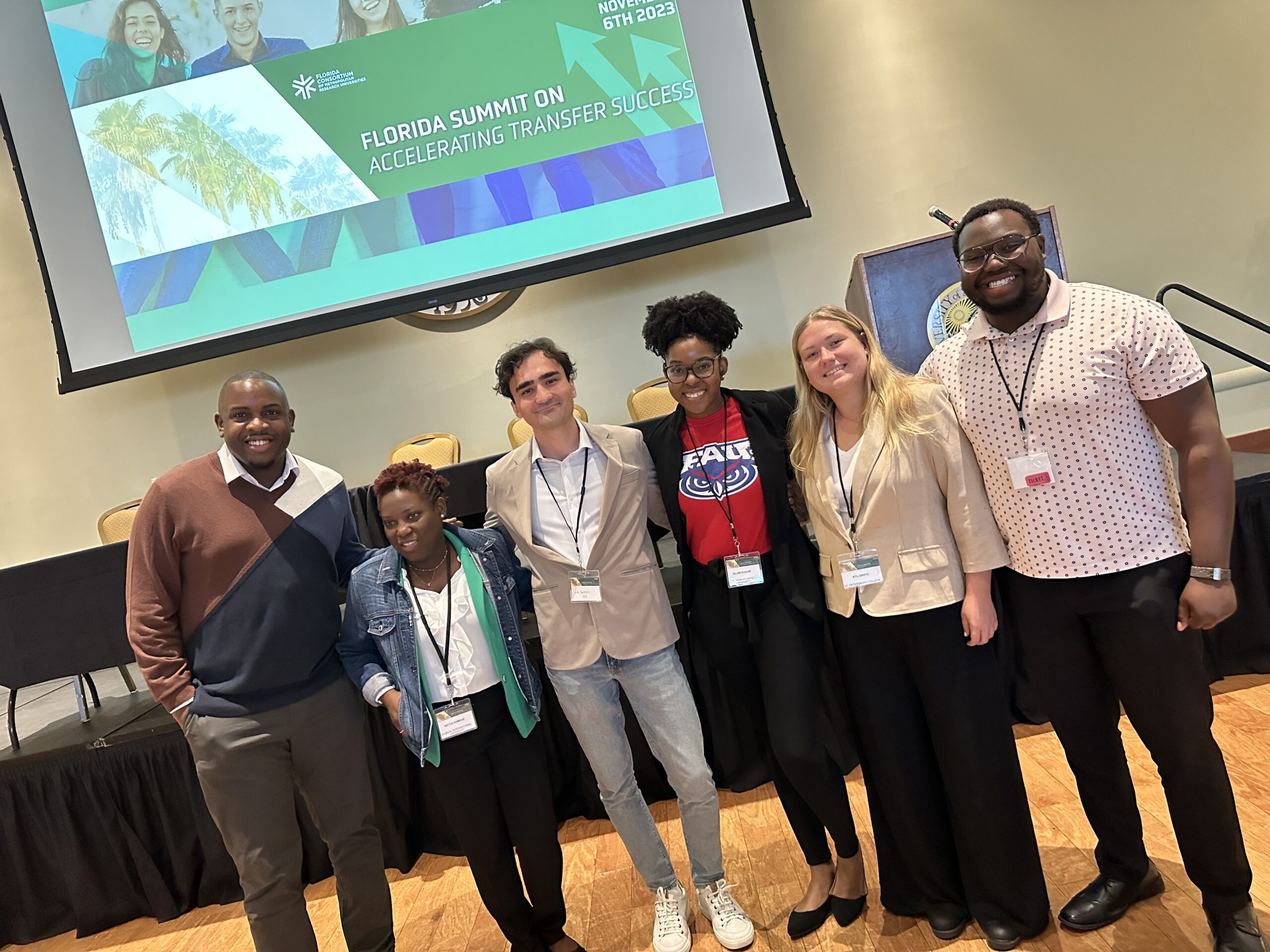Their stories show the need for increased support

In higher education, transfer students navigate unconventional paths, weaving ambition, challenges, and resilience into their journeys. During a student panel at the 2023 Florida Summit on Accelerating Transfer Success, students shared their reasons for transferring, the resources they relied on, and the additional help they would have liked to have.
Across the board, students agreed that asking questions was a crucial step in their journey.
“You have to ask questions to make sure that you’re on the right track,” said Nehemiah Charles, a transfer student who transferred from Polk State College and now attends Florida Atlantic University. “Because if you don’t know anything, how are you supposed to navigate?
Charles regularly visits his academic advisor and keeps asking questions. He also checks in with his mother to share his progress and be reminded of the importance of his journey. “She says “education is the key to the world,” Charles said. As a first-generation student, Charles knows his journey is forging a path for his younger siblings.
“I am the example for my family. Having that kind of lead means they will know what to do and what to exceed, which is a big thing,” Charles said.”
He now majors in geomatic engineering and balances his studies with his on-campus work responsibilities to keep up with tuition costs and living expenses in Boca Raton.
“I’m always doing something. I don’t have the leisure of just not doing anything,” Charles said. “College is not cheap.”
Watch Nehemiah Charles’s Video interview with FCAN: https://youtu.be/Cy5E12gWJYo
Academic advisors serve as crucial mediators between institutions and students because they listen to student’s goals and then show students the options available and the steps they need to complete to help them achieve their goals.
For first-generation students the higher education journey has additional challenges. Some students only realize their institution is the right fit once they’ve attended courses and met with an academic advisor. When you factor in the experience of being a first-generation college student, the journey has additional challenges.

“It’s a process you’re basically doing on your own,” said first-generation Florida International University alumna Kettia Romage. “Going through that on my own was very difficult, so I always mention it. I want everybody to see where I’m coming from and how I got where I am now.”
Romage first attended Miami Dade College (MDC). Since she wanted to become a lawyer, she sought to major in political science, which wasn’t offered at MDC. With help from MDC’s TRIO Student Support Services, Romage transferred to Florida International University. Despite the service, there were many other challenges that Romage learned to navigate. She remembers getting lost on her first day and arriving late to class. During her first semester, Romage almost quit. Fortunately, she held on and now is helping other students achieve their academic goals as an advisor.
Watch Kettia Romage’s Video interview with FCAN: https://youtu.be/CjtyANsXFSw
For Romage and Charles, transferring between institutions was a way of identifying their preferred academic program. Sometimes, transfer students use the transfer option to be better prepared to attend a four-year university.
“I stayed close to home until I got accepted into Florida Atlantic University,” said Ellen Claude, a biological science major. “When I applied for FAU, it was spring, and I didn’t want to fall behind. And that’s when I was like, okay, Broward College would be the most efficient and the most available resource as of right now.”
Claude initially enrolled at Barry University before FAU accepted her. To avoid taking a semester off, she registered for courses at Broward College while waiting to start at FAU in the fall semester. Attending multiple institutions can create challenges when seeking to transfer credits. Being a two-time transfer student, Claude proactively monitored the process to ensure the accurate transfer of her credits.
Claude wants to be a physician. She knew her goal, her ‘why,’ which helped her figure out how to achieve her goal.
“Understanding your why will help you understand how. How do you become a physician? What are you willing to do? How far are you willing to go? And that was also why it helped me not quit,” Claude said.
Watch Ellen Claude’s Video interview with FCAN: https://youtu.be/Elvy8ACtOO0

Group photo of (Left to right) Bernard Huggins – UCF Transfer Center, Kettia Romage – FIU alumna, Vuk Pantovic – UCF student, Ellen Claude – FAU student, Kyli Grote – SPC student, and Nehemiah Charles – FAU student.
There are financial decisions that transfer students make along the way. For university student, Kyli Grote knew that attending St. Petersburg College (SPC) would be less expensive and her credits would easily transfer into the University of South Florida through the Fuse program, which guarantees admission for students completing their associate’s degree from a local community or state college.
Grote’s financial limitations also separated her from her peers, who could afford to go directly into their preferred university.
“They were just as smart as me or academically gifted as me, but some people just can’t afford it, and I think that it was really hard to break that stigma that it’s okay to go to a smaller college and go into a bigger one when you can financially afford it,” Grote said.
Every year, Grote relies on the Free Application for Federal Student Aid, applies to different types of scholarships, and has a job that pays 75% of every class she passes.
Employment programs that help pay for college and support students on guided pathways, such as the Fuse program, go a long way with students.
Watch Kyli Grote’s Video interview with FCAN: https://youtu.be/vKRCbk4ZjuA
Valencia College also offers a similar pathway for students who want to attend the University of Central Florida. The DirectConnect to UCF program advisors and coaches work with potential transfer students to help them with the process.
“Just having that opportunity to ask them general questions, like how are the classes, are they difficult, what professors are good, is a tremendous help,” said Vuk Pantovic, a transfer student who used Valencia College’s DirectConnect to UCF program to help him decide on a major.
“It was an opportunity for me to explore different careers, different majors, what would work for me, and what wouldn’t. And because of their DirectConnect program, I knew there would be a smooth transition,” Pantovic said.
Watch Vuk Pantovic’s Video interview with FCAN: https://youtu.be/8fAMv9WjYSc
From not knowing what to major in, navigating affordability, and balancing work, life, and study responsibilities, transfer students from different parts of the state are resourceful despite being unfamiliar with all the options.
Even with many programs supporting students in applying for and paying for college, students still have many questions that require answers. These student experiences are not just personal sagas but a collective testament to their resilience and determination. Their stories emphasize the importance of ensuring future transfer students have the necessary support to shape their academic journeys confidently.
